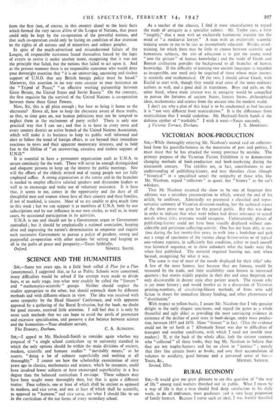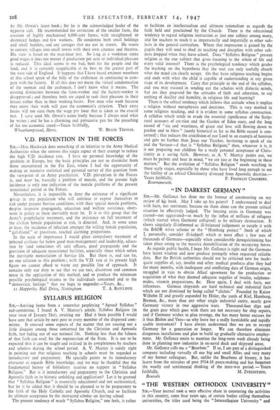RURAL ECONOMY
SIR,—It would give me great pleasure to see this question of "the way of life" among rural workers threshed out in public. What I mean by a way of life is that a man should find deep satisfaction in his daily work, as do all craftsmen, most gardeners and .a very la' ge proportion of family farmers. Because I nurse such an ideal, I was frankly horrified by Mr. Orwin's latest book ; for he is the acknowledged leader of the opposite cult. He recommended the extinction of the smaller farm, the creation of highly mechanised 6,000-acre farms, with straightened or destroyed hedges and few workers. He condemns both small holdings and small hamlets, and any cottages that are not in streets. He wants to convert villages into small towns with their own cinemas and theatres. His view is based on the man-hour test. So lung as a workman earns good wages it does not matter if production per acre or individual pleasure is reduced. This ideal seems to me bad, both for the people and the land, and it is certainly inapplicable at its best to the greater part of the west side of England. It happens that I have heard eminent members of this school speak of the folly of the craftsman in continuing to com- pete with the factory. If all this does not mean the virtual condemnation of the yeoman and the craftsman, I don't know what it means. The existing distinction between the farm-worker and the factory-worker is disapproved ; and therefore both are urged to seek their pleasure in their leisure rather than in their working hours. Few men who work because they enjoy their work will pass the economist's criterion. Their extra hours will not earn them the wage per hour that is taken as the crucial test. I have used Mr. Orwin's name freely because I always read what he writes ; and he has a charming and persuasive pen for the preaching of his too economic creed.—Yours faithfully,
Wheathampstead, Herts. W. BEACH THOMAS.



































 Previous page
Previous page